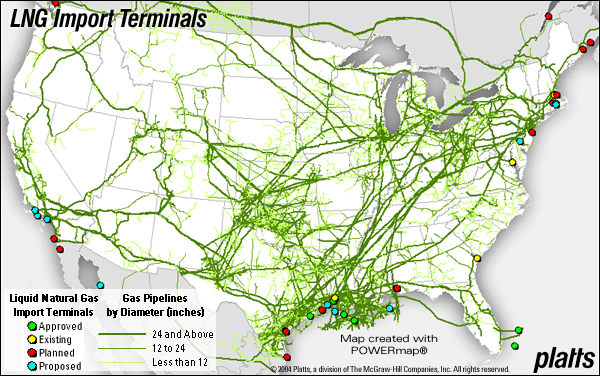
Global LNG market ready to heat up
Liquefied natural gas (LNG), long relegated to a few boutique markets, is about to go mainstream.

Advances that have brought the cost of the supply source down—and, at least as importantly, growing global demand that has brought the price buyers are willing to pay up—have made LNG the hot new topic in energy markets. With oil, natural gas and even coal prices at relatively high levels, the search for alternatives is taking on increased urgency.
LNG has been a mainstay fuel in some markets, notably in Asia, for decades, and even enjoyed a brief flurry of popularity in the US market during the energy crisis of the late 1970s. But most consumption has been fed by natural gas moved through pipelines to markets, even over considerable distances such as Gazprom's shipments to Europe.
A couple of fundamental changes have led to the renewed interest in LNG, which is natural gas supercooled to minus 260 degrees Fahrenheit, and reduced to 1/600th of the volume occupied in its gaseous form. One is technological improvements that have sharply reduced costs for the process of liquefying gas, shipping it via specialized tanker to a market, and then regasifying it.
|
"Liquefaction costs have declined 35% to 50% in the past 10 years." — Gas Technology Institute |
According to the Gas Technology Institute, liquefaction costs have declined 35% to 50% in the past 10 years. Likewise, the cost of building an LNG tanker has fallen by about 45% since the mid-1980s, and regasification costs, while site-specific, have dropped as well, the US Energy Information Administration (EIA) said in a recent report on LNG. As a result, LNG can be brought into major markets such as the US at a price around $3.50/MMBtu.
For most of the 1990s, that price wasn't competitive as markets were awash in $2/MMBtu gas. But at least in the US, prices by late 2002 were solidly in the $4-plus range and rising, leading potential LNG suppliers to take a new look at the economics.
For more on this important subject please visit: http://www.platts.com/Natural%20Gas/Resources/News%20Features/LNG/lng2.html